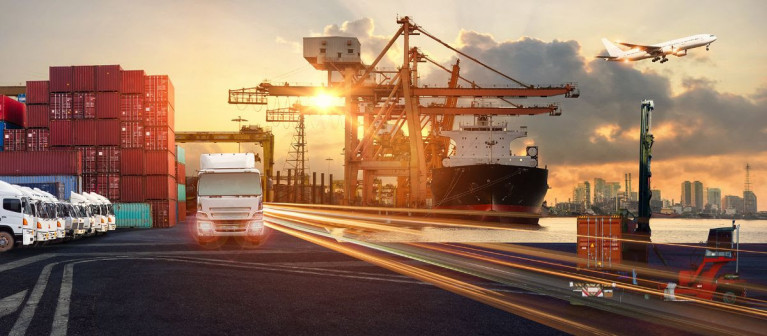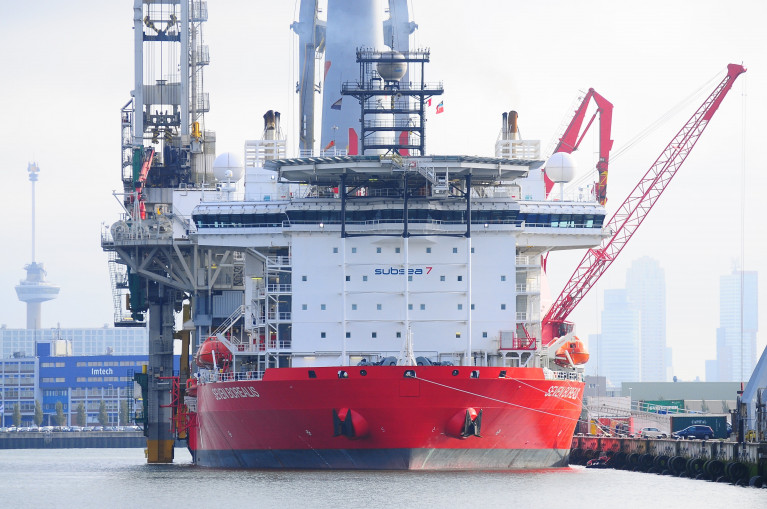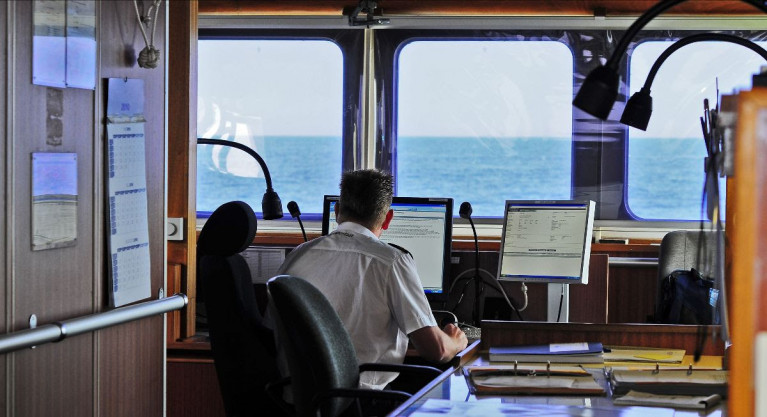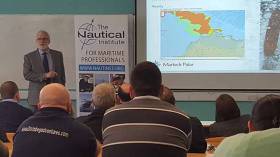Displaying items by tag: Nautical Institute
Webinar from the Nautical Institute: Global Supply Chains - How does Shipping Fit?
The Nautical Institute invites you to join them for a free webinar: 'Global Supply Chains - How does Shipping Fit? which is to take place this Thursday, 11 November between 08:30 - 09:30 (GMT).
At a time when shipping’s role in global supply chains is making daily news, this NI webinar will be considering how the delicate balance has been upset and why ships are stacking up in ports around the word.
Ships need to integrate with other transport modes (road, rail, air etc) and with other services such as legal, finance and risk management, but how does the entire system fit together?
Vivek Sood (known to many as ‘Mr Supply Chain’), will be presenting this webinar where he will share his considerable knowledge of supply chains, practical business strategies, disruptors and career paths for those in the maritime industry.
Sood is a renowned author and has worked on more than 400 global supply chain projects in some 84 countries, with clients ranging from fortune 500 companies to innovative green technology companies.
His work has added cumulative value in excess of $1 Billion, incorporating major transformations in supply chain infrastructure, investments, profitable growth through global supply chain realignment, and cost reduction.
To register for this webinar click here.
The free webinar will be interactive, inviting feedback and questions from attendees and will provide a certificate of participation to all those who attend.
Don't miss the opportunity to attend; noting a recording of the webinar will be made available to NI members only.
The Nautical Institute is a non-governmental organisation (NGO) located in London and with consultative status at the International Maritime Organization (IMO) which likewise of the N.I is also headquartered in the UK capital.
The NI aims is to promote professionalism, best practice and safety throughout the maritime industry and to represent the interests of our members.
N.I. Nearing 50th Anniversary
Afloat also takes this opportunity to highlight that the Nautical Institute marks a maritime milestone as the organisation will celebrate its 50th anniversary in 2022. In recognistion of this the N.I. is to host a series of international events looking ahead to the next 50 years.
These include their AGM, conference and dinner to be held in Plymouth, UK in July and more technical seminars, networking and celebratory events across the world.
The theme for the 50th anniversary events is Maritime Leadership in a Changing World and Afloat will have further details in due course for next year's major event.
Launch of App at European Dynamic Positioning (DP) Virtual Conference: Wednesday, 24 March
An App is to be launched at the European Dynamic Positioning (DP) Virtual Conference next Wednesday, 24 March (09:00 - 13:00)
The event is a collaboration of the Nautical Institute (NI) and the International Marine Contractors Association (IMCA).
(As Afloat reported the Irish operated Mainport Geo with a (DP2 system) entered Cork Dockyard in January and following coverage of conversion into a survey and marine scientific vessel, the ship had just departed the graving dry-dock to berth at a nearby quay).
Next week's talk (details below) by Andy Goldsmith of the IMCA is in co-operation with the (NI), a non-governmental organisation with consultative status at the International Maritime Organization (IMO)
The NI and the IMCA have also joined forces to transform the continuing professional development (CPD) of dynamic positioning operators (DPOs) by issuing a dedicated app which will be launched during the talk.
It’s intended for DPOs who perform a safety-critical role on board offshore DP vessels and need to maintain their technical knowledge. The new app will enable DPOs to expand their professional awareness and understanding of industry guidance, safety bulletins, DP exercises and training drills ‑ all of which will contribute to safety and operational efficiency offshore.
CPD is acknowledged to be an effective way of combatting skills-fade. Allen Leatt, IMCA’s CEO said: "Our DP event reporting scheme reveals that human factors often influence undesirable DP station-keeping events. We are optimistic that CPD will bring a helpful improvement in the safety and risk management of DP operations in our industry."
The CPD modules will be released at six-monthly intervals – and the first module will be available online as soon as the app is officially launched at midday on Wednesday. You can signup for an account via The Nautical Institute’s Alexis Platform in preparation for the module to be released.
The app is designed for use on mobile devices. NI CEO Captain John Lloyd explains: "Using specialist mobile device learning management software, the app is available across a wide range of operating systems. Importantly, it provides offline capability, ensuring the content remains available without internet connection – an important factor for seagoing personnel."
The NI and IMCA are confident that the new app will benefit individual DPOs, by providing a convenient way to keep knowledge and skills current, and the DP industry, by enhancing safety offshore.
For more information, please contact [email protected] and to buy a ticket click here.
Webinar: Celebrating the Contribution of Seafarers and Asking the Question 'Where Next?'
The Nautical Institute is to host a webinar this Thursday (25 June) at 1400 BST (UK time).
So here's an opportunity to join the Nautical Institute CEO Captain John Lloyd and a distinguished panel of international experts in celebrating the contribution of seafarers everywhere and examining what lies ahead for the maritime industry.
The webinar will be held on the 'Day of the Seafarer' to pay tribute to seafarers around the globe, acknowledging their sacrifice and the issues they face.
Many seafarers have been away from home for months and are unsure when they will be able to return home due to travel restrictions. The panel will seek to raise awareness of the work done by seafarers in response to the pandemic and thank them for their contribution.
This webinar will also explore the future of the seafarer, post Covid 19 and in an age of advanced technology and environmental concerns. What will be the impact of automation, increased regulation and even the growing use of renewables for propulsion?
This webinar will be fully interactive, inviting questions from attendees and will provide a certificate of participation to all those who attend.
To register for the event click this link.
The President of the Nautical Institute, the worldwide representative organisation for maritime professionals has told its Irish branch that reality must be separated from the myths about shipping using Polar waters writes Tom MacSweeney.
Capt. David (Duke) Snider from Canada has written the Institute's book on ice navigation 'Polar Ship Operations'. He told Institute members at a meeting in the National Maritime College in Cork that the vast majority of operators in Polar waters had a lot of experience and were "long-term" players in the region.
It was a myth that "wild cowboys" of shipping were "roaring through the Arctic polluting and destroying the environment". He said that global climate change had opened up the Arctic. Change was visual and real.
The Polar Code has been introduced by the International Maritime Organisation. It did not have everything in it that everyone wanted but it was a start and more work was necessary and would be done on it.
#NauticalInstitute – On 17th June in Sydney, Australia the Annual General Meeting of the Nautical Institute will elect Captain Robert Mc Cabe to the Presidency of the Institute for a two year term.
The Nautical Institute is the international representative body for maritime professionals involved in the control of sea-going ships and is a non-governmental organisation (NGO) with consultative status at the International Maritime Organisation (IMO). The Institute has 6,500 members worldwide across 110 countries. The Sydney Branch will host the international Annual General Meeting of the Institute on 17th June at the Maritime Museum in Darling Harbour as part of a conference on Navigational Competence.
Captain Mc Cabe is a career long member of the Institute, a former Chairman of the Institute's Technical Committee and a frequent contributor to international conferences particularly on e-Navigation and user needs issues.
An Irish Master Mariner, Captain Mc Cabe is presently Director of Operations and Navigation Services at the Commissioners of Irish Lights and previously served with Irish Shipping Ltd.
Welcoming the election of an Ireland Branch member to the highest office of the Institute, Branch Chairman Deirdre Lane said: "The primary focus of the Nautical Institute is to raise international standards of competence and education across the marine industry. Robert Mc Cabe has shown significant leadership in the Ireland Branch and internationally and we look forward to his term as President as an opportunity to further advance the Institute's aims".



























